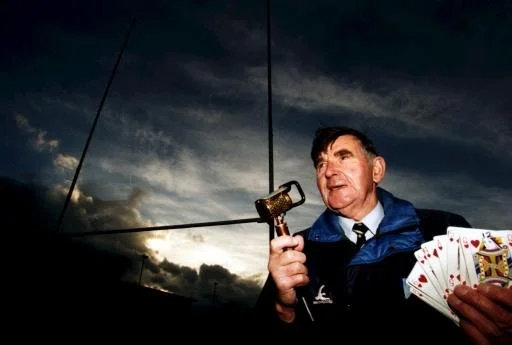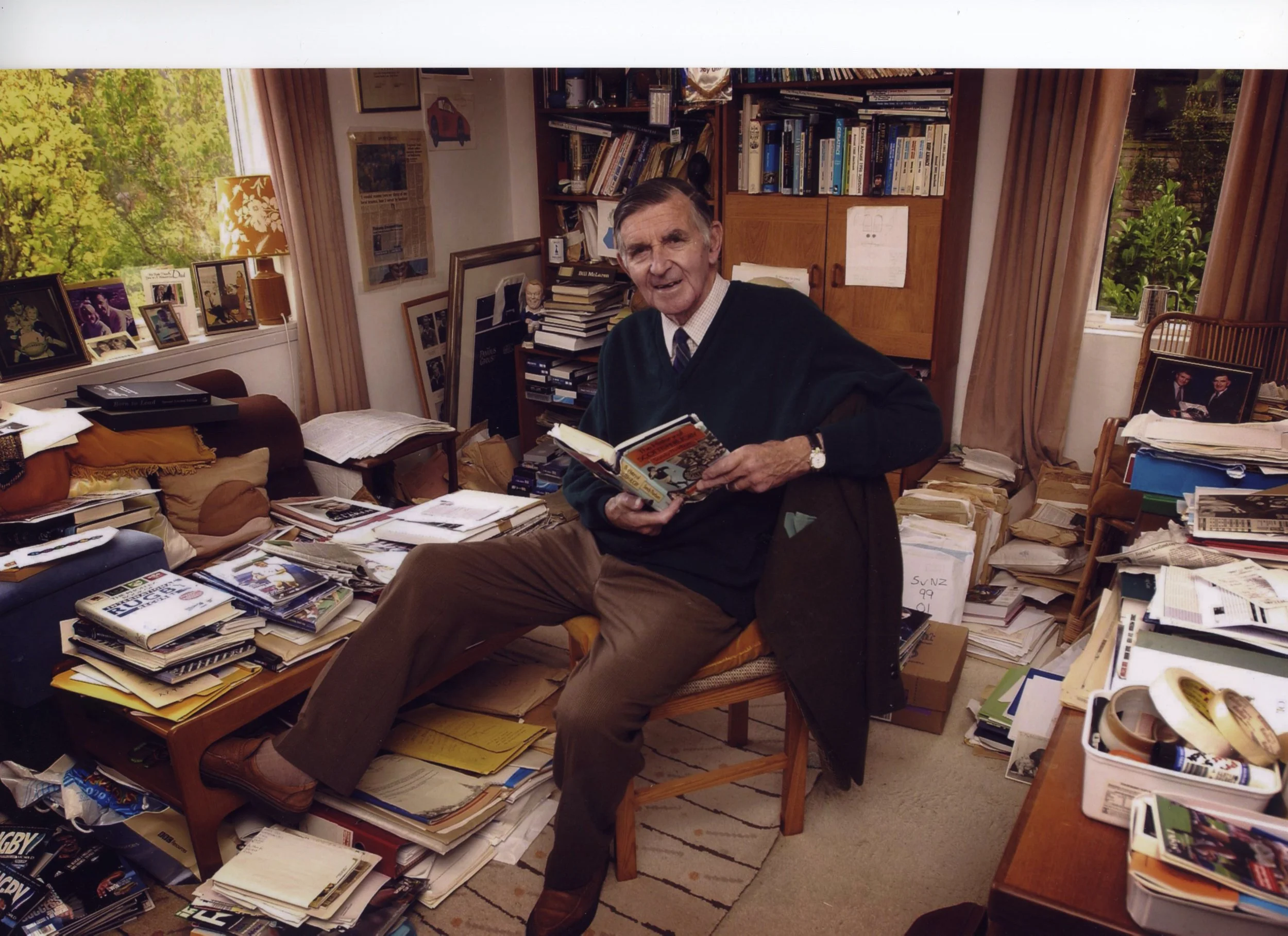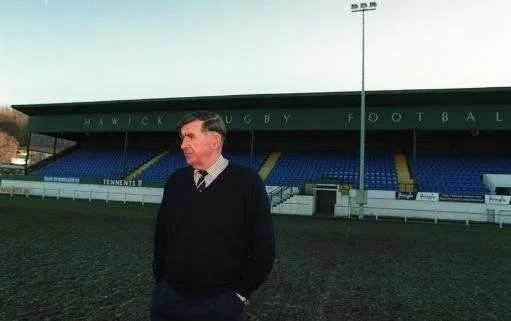The British public has been particularly blessed with the quality of its sports commentators and as John Arlott was synonymous with long hot summer's afternoons at Trent Bridge, Henry Longhurst with Autumn leaves falling on Wentworth's greens, Dan Maskell - "Oh, I say" - with unforgettable Centre Court battles, Peter O'Sullivan with photo-finishes and stewards enquiries, Harry Carpenter with left jabs and right hooks and Eddie Waring with up-and-unders and early baths, so Bill McLaren was without question the Voice of Rugby Union Football.
Bill McLaren's Story
Allan McCredie was a friend of Bill's for very many years. Much has been said in the newspapers of Bill's role as the Voice of Rugby, but we asked Allan to record his memories of the Bill whom we knew and had great affection for within Hawick…
“When I think of Bill McLaren, I think of him as a great man, not just a great rugby commentator.. To me he had five great loves in his life and passion for all of them:
Family
Rugby
Teaching
Golf
Hawick”
“I’ve talked a lot about Bill's loves, but he himself was universally loved and held in such high esteem I don’t remember him ever having to flash a pass to get anywhere at any rugby ground. When you went anywhere with him you could hear people whispering: 'There's Bill McLaren', and people would come up to him and say how much they loved his commentaries. He had time for everyone. His views and opinions were sought the world over. He’d often say to me: 'Only 10 holes today. Somebody from New Zealand is phoning for an interview'. How I wish I could have been his agent.
His journalistic skills were sadly understated in reviews of his career. His match and analytical reporting for the Glasgow Herald were superb over a large number of years. The time and effort he put into the articles were just as devoted as the rugby commentaries. After commentating on an international on the Saturday he would fly home immediately and on the Sunday watch the video of the game looking for a theme for his Monday article so he could explain to the layman how Scotland had won or lost the previous day. On one occasion his video skills failed him (a regular occurrence) and he appeared at my door at 10 a.m. Sunday morning looking for a copy of a Scotland v England game. Unfortunately I was 200 miles away visiting my brother on the way back. My mother who was used to dealing with these visits and his phone calls phoned my brothers and explained the situation. After some thought I phoned my mother’s cousin who lived close by to see if she had a copy. She had. Informed of this fact Bill took off at a rate of knots to retrieve the video. The following evening he appeared at the door with a box of chocolates and asked me to pass them on with his grateful thanks. He also put the same dedication into articles he was asked to produce for magazines, programmes and numerous other publications. As an author he contributed to at least half a dozen successful books. In the nineties I helped him with his first autobiography and Bill’s Lions. He had little faith in people’s ability to read his writing so he wrote his notes and then created an audio recording. I had to find him an audio typist to create a draft document on a computer. He then meticulously proof read the document himself so that a perfect document was sent to the publisher.”
“On a personal note, it was a great privilege to know the man and I was deeply honoured by what he said about me in his book. I met Bill first at primary school. My Dad had gone to school with him so it was like he knew me. He ended my unpromising rugby career at 13 by sending me off for kicking the ball. He said the game was played with hands. I was a prop at the time. From the early 80s to the Noughties, I don‘t know how many miles we travelled together and games we watched but I loved every minute. One final story that sums him up for me. In the Eighties and Nineties I went to every Five Nations game without getting time off school.
This led to some amazing adventures. Anyway, in 1986, Bill asked how I was getting to Dublin. 'I hitch to Carlisle, train to Crewe then to Holyhead, boat to Dublin arriving 6 a.m..' 'You must come to breakfast at Jury’s', he said. I said I knew where it was as it was close to Lansdowne Road, so I got off the boat, caught the DART train and arrived at Jury’s at 6.45, dishevelled and asked for Bill. I was impolitely told to get lost so I sat in a chair. Ten minutes later, Bill phoned Reception to ask where I was. Well, the attitude towards me changed completely! I was given directions to his room, had a shower, he took me to breakfast and introduced me to all and sundry. A great day. Mind you, I had to work as he took me back, made me shuffle his cards and spend 30 minutes on player identification.
That was Bill. He always referred to Bette as a queen, but he was a king.”
“He loved the game from an early age. I’m sure he flinched every time somebody referred to the rules of rugby. He always said rugby had no rules, only laws. He understood the laws as well as any referee because he went to the referees' meetings to make sure he understood them. That's why in the days before 'miked-up' referees and action replays he could give viewers an accurate description of what was happening. People often talk about his big sheets but very few people realise how much work went in. He sent letters to clubs and countries that he was due to cover in games with a questionnaire for every possible player to fill in topics including school achievements, famous relatives, and, well, the common or garden stuff: weight, height etc..
He also knew details about the groundsman, doctors, coaches, anyone who could possibly appear. I was disappointed when a dog invaded the pitch and he didn’t know his name. He used different coloured pens for each different type of information: fine nibbed bics (that’s another sponsorship deal he missed out on). If he had had an agent, who knows what he would have been worth. He kept his own records and bought newspapers that gave full match descriptions of games world wide so that he was solely responsible for his facts. His records were so good he used to write programme notes for international programmes. He loved the characters he met. He thought that this was what made the amateur game so special. The change to professionalism, and substitutions, took some of the gloss of it: well he had to research seven extra players on both sides!
He loved flair: Jim Renwick, Andy Irvine, Gavin Hastings, David Duckham, too many Welsh standoffs to name, lots of Irishmen because of their unpredictability, and of course David Campese. Most of his funny stories seemed to involve Irishmen and, boy, could he mimic them, although the other nationalities were not immune. He did say he could have joined ENSA if General Mark Clark had not required him personally to rid Italy of the German yoke. Anyway one of my favourite stories which he told was about Willie Anderson, the Irish internationalist. Willie turned up late for training once and the coach gave him a roasting for missing the warm up. Willie replied: 'I knew I was going to be late so I turned the heating up in the car to compensate'.”
Bill & Family
“Bette, the queen amongst women, whom he met at a Town Hall dance and who was to be his soul mate for the next 60 years and the best looking caddie ever to grace the Vertish.
Two daughters whom he adored: Janie whose passing left a great void in his life, and Linda whom he described as a rock and who helped so much in his later years. Five grand children, all with their special talents, three becoming rugby players - which justified the hours he spent kicking a rugby ball up Wilton Lodge Park but he did not neglect Alex and Lindsay.
It's sad to think he never really was able to appreciate James' and Rory’s achievements in playing together for Scotland A last summer. He would have been so proud. Alex’s interests were not Bill’s, but he respected them just the same. Lindsay was the only girl. He marvelled at her beauty and was extremely proud of her achievements.”
Bill & Teaching
“Bill was a far more rounded PE teacher than someone who just taught primary school rugby. He taught at both primary and secondary level and could turn his hand to any sport. At secondary level he taught whatever the curriculum demanded, from circuit training to basketball. I remember we got circuit training with him on a Friday and he was a hard task master. We would pray it was an international weekend and we’d get Shorty Anderson who would say: 'Right boys. Pick two teams.' We played football for the next 40 minutes.
He was his own boss at primary level and although rugby was his great passion he taught general PE to one and all. He organised a hockey tournament for the girls and in the summer there was athletics and cricket. The athletics organisation SAAA used to promote a scheme called the Thistle Awards at gold, silver, and bronze levels. Bill strived hard to make sure every child got some sort of award and the paper work he had to keep for this to happen was immense. Every year it was a Hawick primary school who gained the overall award, for the most individual awards.
Primary rugby is what he is known for. He must have organised and run it for over 30 years before handing the torch for 7 a.m. winter inspections over to May Sinclair. He had a system where he phoned x people if a game was off, then they phoned so many: a system that stopped players and families turning up on a frosty morning for 30 years. The afore-mentioned May Sinclair was by far the most famous female coach. She was not the first. That record belonged to a Miss Simpson at Trinity who did not bring a smile to Bill's face when an article about her prowess appeared in the Sunday Post.
As a referee, Bill allowed me to ref games that top class refs dream of: Barbarians v the Rest of the World, Northern Hemisphere v Southern Hemisphere, even Drumlanrig v the Rest of the World! Mind you, most Saturdays it was plainer fodder: Drumlanrig, Wilton, and Trinity with Bill Borthwick, May Sinclair and George Scott giving you helpful advice from the touch line. Bill always said the ref was always right and nobody argued with Bill.”
Bill & Golf
“Bill had a great love of golf. He obviously played it from an early age and was good enough to play in the Hawick Club Championship, and into his seventies could easily play to a handicap of 12 or less. He must hold the record for the most holes ever played on the Vertish. When I knew him, he played nearly every day with his faithful caddie. He said he couldn’t afford to pay her what she was worth.
I was lucky enough to play with him during holidays, sometimes day after day. I think he only put up with me because I was easy meat. He had a regular Thursday game with Harry Whitaker when he retired. This was a different proposition because Harry had a lower handicap and this brought out the competitive spirit in Bill. Not that it wasn’t always there. If he played on his own, he kept his score at every hole. He was also a member at Gullane: not that I was ever good enough to play him there. He loved his holidays with Bette at the Royal Marine Hotel North Berwick – even more when the family joined them there. He obviously loved the views of the golf courses he played, because he had several paintings by the late Jack Young of some of his favourite holes.
He did make a video which featured his golfing skills, called 'A Round with Alliss' and shot at Rosemount. He plays very well on the video but he told me it was well edited. They got to play a tee no longer in use at Rosemount which faced on to a parallel fairway. Bill said he hit a monster drive, walked off the tee proud as punch, only to be told to go back and hit another shot as they didn’t have any cameras where he’d hit it. I have a copy of this video but my great regret is I don’t have a video he made of a programme called 'Personal Choice' from the early 70s although bits of it were shown as part of the John Inverdale documentary. He was filmed playing the first two holes at the Vertish with his family. At the time Bill’s swing had an outrageous loop at the top and when it was shown the club went up the club came down but they had edited out the loop at the top.”
Bill & Hawick
“Bill had great love for Hawick - the town, the people, what it produced and who it produced - not just rugby players. I think he invented product placement before anyone thought of it: Hawick Balls, Hawick knitwear - he was always featuring them.
Lots of people suggested he should get a knighthood but I wonder what would have happened if he had been offered the Freedom of Hawick. Maybe he was and turned it down: he was that sort of private person.”
Allan McCredie







